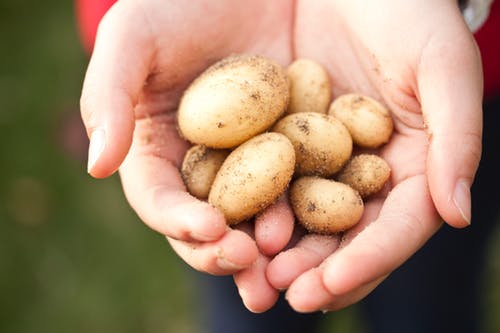Posted: Dec 18, 2018

A British company is turning potato industry waste into fiberboard.
Fighting food waste has been an ongoing battle — and most of the stories are pretty straightforward: sending off scraps for animal feed or brewing leftover bread into beer. But every now and then a truly innovative story pops up that leaves you thinking, "Seriously?" For instance, try this one on for size: A London-based company called Chip[s] Board wants to turn leftover potato peels into a material that can replace the kind of fiberboard you see in IKEA furniture.
To answer the first question most people (apparently) have on their mind, "There are no edible potato chips in our products," the company explains on its website. "We use non-food-grade industrial potato waste in production." It's not that hard to see why people might get confused though: Under the "Our Suppliers" section of its website, Chip[s] Board proudly boasts that it's partnered with the world's largest frozen potato product producer, McCain. Hey, if you want potato peels, you got to the source!
So if not edible potatoes, how are these boards made? More specifically, Fast Company reports that Chip[s] Board uses a proprietary process to refine these leftover peelings into a binding agent that is then mixed in with a laundry list of other materials — bamboo, recycled wood, beer hops, and unrefined potato skins — to create "medium-density fiberboard," referred to in the industry as MDF.
According to the company, what sets Chip[s] Board's MDF apart is that, unlike most MDF that uses binding agents that can be toxic such as formaldehyde, Chip[s] Board's potato-based binder is said to be fully-recyclable and thus more environmentally-friendly. Additionally, the company promises that it's just a strong as all that MDF used in all that cheap furniture in your house you've really been telling yourself you are going to replace but never have.
For the record, IKEA is not associated with Chip[s] Board, but as Fast Company points out, targeting the Swedish furniture brand would make a lot of sense: They use more MDF than anyone else in the world. If only Chip[s] Board could figure out how to make MDF out of uneaten meatballs, it would be a match made in heaven.
By Mike Pomranz
December 17, 2018
Source: Foodandwine.com
Go-Wine's mission is to organize food and beverage information and make it universally accessible and beneficial. These are the benefits of sharing your article in Go-Wine.com


The Wine Thief Bistro & Specialty Wines is a locally owned small business in downtown Frankfort, IL offering world class wines in a relaxed, casual gathering spot for friends and family. Offering world class virtual tastings and touchless carryout.
https://www.twtwineclub.com/aboutus
Go-Wine 25 Great Wineries in US selection prioritizes quality, value and availability.
www.go-wine.com/great-wineries-in-america
Tasting wine is a nice experience, but visiting the places in which wine is made is a magic moment. Available in New York City for touchless pickup.